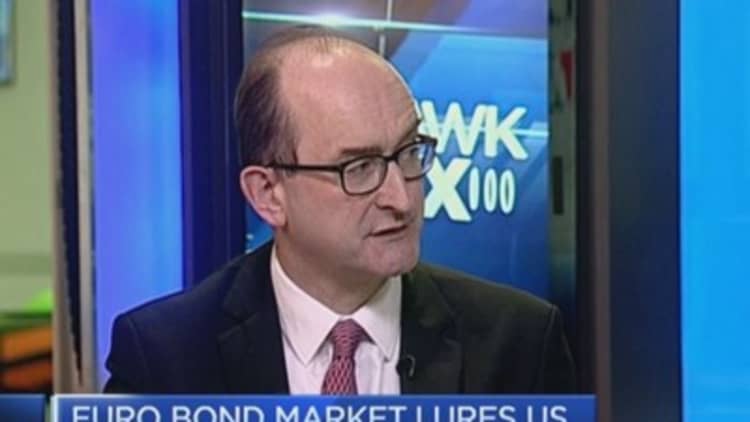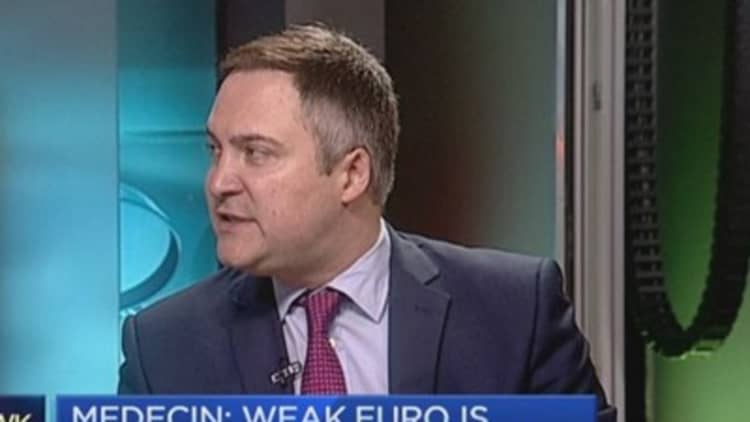
The European Central Bank's (ECB) started its massive 60 billion euro-a-month ($66.3 billion) bond-buying program on Monday with analysts arguing over the effect this would have on the world's fixed income markets.
As soon as the start was announced last Thursday, yields on bonds across Europe shot lower – with bond yields and prices having an inverse relationship.
Sovereign yields are at record lows for many countries and have even crossed into negative territory. The spread between the 10-year U.S. Treasury and the 10-year German bund has widened out to its widest level in over 25 years. By Monday, 10-year German bunds were yielding 0.386 percent while Italian and Spanish yields have been squeezed to around 1.3 percent.
However, Michael Gallagher, the director of research at independent, global research organization IDEAglobal, believes this move could only be short term.
"If you're looking out, sort of, six months from here European yields are going to be higher," he told CNBC Monday.
Peter Chatwell, an interest rate strategist at Mizuho International, has a different thesis. He told CNBC via email that the markets are still in a "sweet spot of bond buying" and predicts the 10-year core European yields will fall until the summer.
"Investors who can trade with a short term horizon should be buying here," he said.
After years of promises and various liquidity programs, ECB President Mario Draghi announced Thursday that the bank would start to buy sovereign bonds this week. With the suppression of yields it means that euro zone countries can finance their debts at lower prices and helps with the recovery process. It also means investors are pushed into riskier areas of the market and hopefully stimulates lending and growth.
Gallagher told CNBC that there was "no value" left in buying European bonds anymore and expects them to push higher in price. He noted that there had been an upward movement in U.S. Treasury yields when QE (quantitative easing) started in the U.S. and expected similar in the euro zone. He added that yields in Spain and Italy would likely rise at a faster pace as they had a better correlation with U.S. yields, with the U.S. Federal Reserve looking to normalize interest rates in the near term.
"If the ECB are half right in terms of their 2016 growth and inflation forecasts, the market's got a major mispricing," Gallagher said.
Credit strategy analysts at Barclays have estimated that the ECB's asset purchases will actually outstrip the net-supply by a factor of 3-to-1 across the affected markets. The analysts - led by Credit Strategist Zoso Davies - expect European investors to maintain their holdings of the targeted assets but believe that international holders are set to cash in.

"Euro area investors are likely to rebalance within the (European government bond) space by taking more duration and rating risk. Net selling is instead likely to come from international investors, reinvesting in higher yielding markets," the bank said in a note on Monday.
Davies added that short-term yields are likely to push further into negative territory in the near future.
Meanwhile, Frederik Ducrozet, a senior euro zone economist at Credit Agricole, believes that the benchmark German bund could push down to 30 basis points in the near term and "possibly beyond" until the market adjusts to the "new normal."
However, in the the medium term the French bank says that a combination of QE, solid fundamentals and rising inflation will mean that core sovereign yields will ease higher.
"We forecast the (10-year) bund yield at 80 basis points by year-end," Ducrozet said in a note at the end of last week.
Follow us on Twitter: @CNBCWorld


